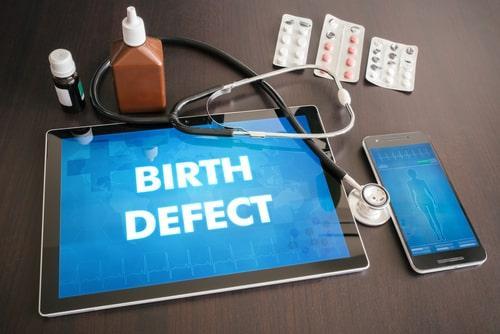Chicago, IL 60601
FREE CONSULTATIONS 312-462-4200
TOLL FREE 833-462-4200
Recent Blog Posts
When Are Forceps Appropriate During Delivery?
 Healthcare providers are essential during childbirth for ensuring a safe delivery and healthy infant. The responsibilities these caregivers have are enormous and parents must place their trust in their team of doctors during a physically vulnerable and emotionally heightened moment. While most deliveries are successful and parents are rewarded with the joy of meeting their child for the first time, some deliveries are complicated and require quick, deft decision-making and medical treatment.
Healthcare providers are essential during childbirth for ensuring a safe delivery and healthy infant. The responsibilities these caregivers have are enormous and parents must place their trust in their team of doctors during a physically vulnerable and emotionally heightened moment. While most deliveries are successful and parents are rewarded with the joy of meeting their child for the first time, some deliveries are complicated and require quick, deft decision-making and medical treatment.
When labor is not progressing or a baby needs urgent delivery, doctors may recommend a forceps delivery to help the baby come out more quickly. Birth forceps are exactly what they sound like - specialized tools that help a doctor grasp an infant and guide them out with pulling motions. While birth forceps can be very effective, they can result in serious injuries if they are used inappropriately.
When Are Forceps the Right Delivery Tool?
Can We Sue Our Doctor for Not Telling Us About Our Baby’s Birth Defect?
 From time to time, a story will make headlines about a child who was screened for genetic or physical abnormalities in utero, given a clean bill of health, and then born with a serious or life-threatening birth defect. And in 2009, the Illinois Appellate Court decided that parents who prove that a doctor mistakenly diagnosed or failed to diagnose genetic disorders can seek damages for the emotional and financial damages the parents incur when they give birth to a child with a diagnosable disability.
From time to time, a story will make headlines about a child who was screened for genetic or physical abnormalities in utero, given a clean bill of health, and then born with a serious or life-threatening birth defect. And in 2009, the Illinois Appellate Court decided that parents who prove that a doctor mistakenly diagnosed or failed to diagnose genetic disorders can seek damages for the emotional and financial damages the parents incur when they give birth to a child with a diagnosable disability.
If you requested tests that were intended to show genetic or developmental disabilities while you were pregnant and a doctor misread the results or failed to recognize a prenatal developmental disorder, you may be able to take legal action with the help of an experienced Chicago, IL birth injury attorney.
What Are Examples of Common Wrongful Birth Defects?
Pregnant women who are at a heightened risk of carrying certain genetic disorders are frequently screened during pregnancy, although genetic screening is becoming more common as the trend of women having children at older ages continues. Sometimes genetic screening looks normal and then developmental irregularities appear for the first time in an ultrasound later in the pregnancy. Parents frequently decide to terminate these pregnancies because the life expectancy and quality of the child can be seriously negatively affected. Some of the serious genetic disorders or developmental abnormalities include:
The Doctor Dropped Our Baby During Delivery. Is This Normal?
 While a baby dropped on its head may make up a good portion of schoolyard taunts, when an infant is dropped during delivery, it is no laughing matter. Most Chicago mothers envision their labor and delivery ending with a final push, a gentle catch by the attending doctor or midwife, followed by tender first moments with baby. When these first moments are disturbed or taken away altogether because of a doctor’s carelessness or distraction handling a newborn infant, there are no words to describe the confusion and devastation that follow.
While a baby dropped on its head may make up a good portion of schoolyard taunts, when an infant is dropped during delivery, it is no laughing matter. Most Chicago mothers envision their labor and delivery ending with a final push, a gentle catch by the attending doctor or midwife, followed by tender first moments with baby. When these first moments are disturbed or taken away altogether because of a doctor’s carelessness or distraction handling a newborn infant, there are no words to describe the confusion and devastation that follow.
Every child deserves a fair chance at starting her life off with health and joy; the delivery process is already complicated and chaotic enough without additional complications. But if your infant was dropped or mishandled during delivery and injured or killed as a result, you can take action to seek compensation and prevent such a tragedy from happening to someone else.
Can I Sue a Doctor for Failing to Vaccinate My Infant?
 A delivery room in an Illinois hospital’s maternity ward is a joyful but chaotic place during and after childbirth. So many things are happening at once, and while most doctors and nurses do an excellent job of managing their responsibilities to a mother and newborn, some medical practitioners fail to do so. In the hubbub of an infant’s post-delivery care, hospital staff may forget to administer vaccines, an essential line of defense against serious illnesses for newborns.
A delivery room in an Illinois hospital’s maternity ward is a joyful but chaotic place during and after childbirth. So many things are happening at once, and while most doctors and nurses do an excellent job of managing their responsibilities to a mother and newborn, some medical practitioners fail to do so. In the hubbub of an infant’s post-delivery care, hospital staff may forget to administer vaccines, an essential line of defense against serious illnesses for newborns.
Infants, whose immune systems are underdeveloped and require assistance to fight off many potentially fatal illnesses, can be seriously injured and even killed without proper vaccination. If your infant fell ill and you believe your doctor failed to vaccinate him or her, read on.
Which Immunizations Are Standard in Illinois?
Children are subject to a rigorous vaccine schedule as part of routine childhood healthcare. Immediately after birth, infants are given Hepatitis B and vitamin K shots. Over the next year, children also receive vaccinations against:
When Do Birth Injury Symptoms First Appear?
 Birth injuries in Illinois children may only take a brief moment to occur but they can be an ongoing source of parental stress, developmental challenges, and medical expenses for many years and even for a child’s entire life. Sometimes, signs that a child has suffered from a birth injury may be immediately present; other times, symptoms do not appear until a child has gotten old enough for certain developmental delays to become clear.
Birth injuries in Illinois children may only take a brief moment to occur but they can be an ongoing source of parental stress, developmental challenges, and medical expenses for many years and even for a child’s entire life. Sometimes, signs that a child has suffered from a birth injury may be immediately present; other times, symptoms do not appear until a child has gotten old enough for certain developmental delays to become clear.
No matter when a birth injury becomes apparent, obtaining proper treatment is essential for avoiding long-term complications that may affect a child forever. Here are common symptoms of birth injuries that can appear in different stages of childhood development. Even if you are unsure whether your child may be manifesting symptoms, get a professional opinion so you can take action if necessary - and then contact an experienced Illinois birth injuries attorney who can help you hold the responsible party or parties accountable.
Can Epilepsy Be Caused by Birth Injuries?
 Generally, our brain uses its electrical signals in an organized fashion, sending messages from one part of the brain to another and allowing us to move our limbs, talk, think, and carry out daily activities. However, for people who have epilepsy, seizures are caused by sudden, uncontrolled bursts of electrical activity within the brain, causing normal thought patterns and certain physical functioning to shut down until the seizure ends.
Generally, our brain uses its electrical signals in an organized fashion, sending messages from one part of the brain to another and allowing us to move our limbs, talk, think, and carry out daily activities. However, for people who have epilepsy, seizures are caused by sudden, uncontrolled bursts of electrical activity within the brain, causing normal thought patterns and certain physical functioning to shut down until the seizure ends.
The causes and severity of epilepsy can vary dramatically. Some people have mild seizures from time to time while others experience severe seizures much more often. While the exact cause of epilepsy is sometimes unknown, certain birth injuries during pregnancy or childbirth can make seizures more likely throughout a child’s life.
What Kinds of Birth Injuries Cause Seizures?
Some of the conditions that cause seizures are inevitable, even with the best medical care. Others, however, occur because of careless or negligent behavior on the part of doctors, nurses, or midwives. Birth injuries that may cause seizures include, but are not limited to:
What is the Difference Between a Birth Injury and a Birth Defect?
 Parents of children who have been injured or killed during a traumatic childbirth in Illinois are often left reeling and desperate for answers to difficult questions. How did this happen? Could it have been avoided? Is anyone responsible? Determining answers to those questions can be quite difficult, especially because it is not always immediately clear whether the child is suffering from a birth injury or a birth defect. While these terms sound similar, they describe very different issues, and it is important to understand what each means as you seek a resolution for your and your child’s suffering.
Parents of children who have been injured or killed during a traumatic childbirth in Illinois are often left reeling and desperate for answers to difficult questions. How did this happen? Could it have been avoided? Is anyone responsible? Determining answers to those questions can be quite difficult, especially because it is not always immediately clear whether the child is suffering from a birth injury or a birth defect. While these terms sound similar, they describe very different issues, and it is important to understand what each means as you seek a resolution for your and your child’s suffering.
What is a Birth Defect?
A birth defect is a congenital abnormality that can occur for several reasons, all of them having to do with the genetic development of an unborn infant. A birth defect can happen for no apparent reason; sometimes when genes copy themselves, they make small mistakes that can lead to tragic consequences. Other times, a birth defect happens because of a parent’s exposure to substances, such as alcohol or cigarette smoke, that cause a developing infant’s genes to change and function incorrectly. Examples of common birth defects include, but are not limited to:
My Doctor Says We Experienced Shoulder Dystocia During Childbirth. What Does That Mean?
 Pregnancy and childbirth present significant health challenges to both Illinois mothers and their infants. While many things have the potential to go wrong, most children are born safely and in good health. Unfortunately, there are occasions where either the mother or child is injured for a variety of reasons; sometimes, these birth injuries cannot be helped even with the best medical care. However, other times, injuries are caused or worsened because a mother’s obstetric team fails to appropriately respond to medical emergencies. One such emergency is shoulder dystocia, a condition in which one or both of an infant’s shoulders become stuck during labor. To learn more about shoulder dystocia and its consequences, read on.
Pregnancy and childbirth present significant health challenges to both Illinois mothers and their infants. While many things have the potential to go wrong, most children are born safely and in good health. Unfortunately, there are occasions where either the mother or child is injured for a variety of reasons; sometimes, these birth injuries cannot be helped even with the best medical care. However, other times, injuries are caused or worsened because a mother’s obstetric team fails to appropriately respond to medical emergencies. One such emergency is shoulder dystocia, a condition in which one or both of an infant’s shoulders become stuck during labor. To learn more about shoulder dystocia and its consequences, read on.
What is Shoulder Dystocia and How Does it Happen?
Usually, an infant’s head is the most difficult part of the body to push out of the vaginal canal during labor. Once the head emerges, the shoulders and the rest of the body generally follow right away. Sometimes, however, one or both shoulders can become stuck in the mother’s pelvis.
What Kinds of Birth Injuries Can Be Caused by Pitocin Induction?
 When a pregnant woman prepares to give birth, her body releases a hormone called oxytocin. While oxytocin plays an important role in developing feelings of love and bonding in mammals, it also makes the uterus contract during labor. Strong, regular uterine contractions are essential not only for pushing out the baby, but also for ensuring the entire placenta is expelled and preventing postpartum hemorrhaging.
When a pregnant woman prepares to give birth, her body releases a hormone called oxytocin. While oxytocin plays an important role in developing feelings of love and bonding in mammals, it also makes the uterus contract during labor. Strong, regular uterine contractions are essential not only for pushing out the baby, but also for ensuring the entire placenta is expelled and preventing postpartum hemorrhaging.
When labor is prolonged, or if it has not started at all, there can be health risks to the mother and the infant. To speed up labor, sometimes a drug known as pitocin can be given to the mother. Pitocin is a synthetic drug that mimics oxytocin, and while it is usually used without harmful effects, it can cause serious problems to an infant if it is used incorrectly. If your infant has been injured because of pitocin, consider speaking with a birth injuries attorney as soon as possible.
Are Leg Lengthening Treatments Effective for Children with Cerebral Palsy?
 Because of the complexity and unpredictability of symptoms of cerebral palsy in young children, parents often struggle to manage the various treatment options and their effectiveness. Research is continually being done on how cerebral palsy can be treated and managed and one treatment that may be helpful for some children whose cerebral palsy has caused a leg length discrepancy is leg lengthening treatment. Research has shown that leg lengthening treatment can be an effective way to manage the difficulties of a leg length discrepancy, but it also has serious risks and parents should consider this option carefully before committing their child to this procedure.
Because of the complexity and unpredictability of symptoms of cerebral palsy in young children, parents often struggle to manage the various treatment options and their effectiveness. Research is continually being done on how cerebral palsy can be treated and managed and one treatment that may be helpful for some children whose cerebral palsy has caused a leg length discrepancy is leg lengthening treatment. Research has shown that leg lengthening treatment can be an effective way to manage the difficulties of a leg length discrepancy, but it also has serious risks and parents should consider this option carefully before committing their child to this procedure.
What Are the Symptoms of a Leg Length Discrepancy?
Leg length discrepancies resulting from cerebral palsy exist at birth, but often do not become apparent until a child is old enough to move by herself. They may be difficult to diagnose because a discrepancy may be small enough to be unnoticeable but still cause significant delays in walking, running, and jumping.





